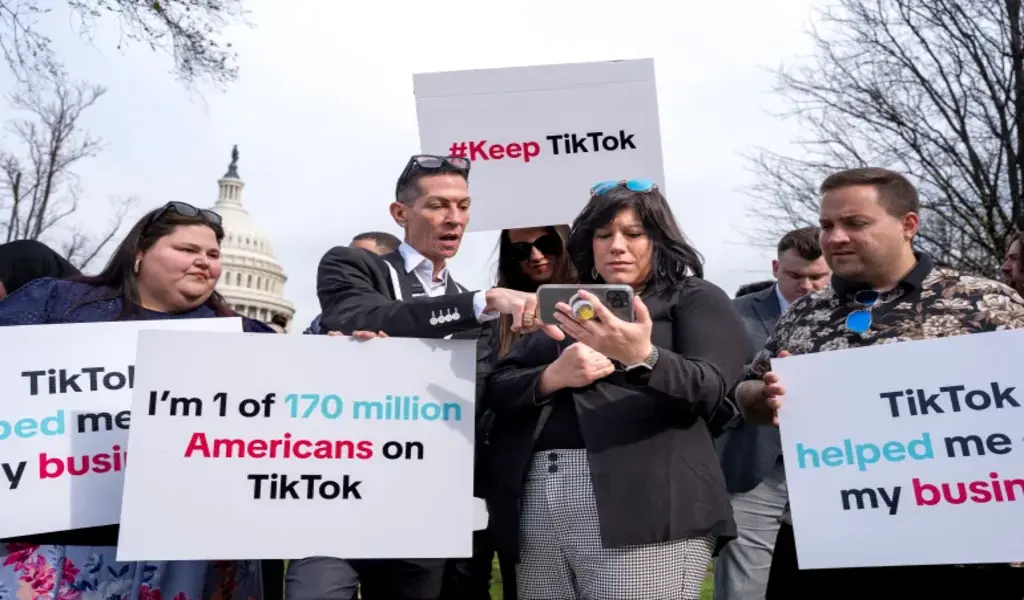(CTN News) — The US House of Representatives has passed a bill prohibiting TikTok as part of a broader effort to target China and large digital companies.
The law got strong bipartisan support, with a vote of 352 to 65. It now travels to the 100-member Senate, where its chances are less certain. President Joe Biden has stated that he will sign the bill into law if it reaches his desk.
If that happens, TikTok’s Chinese owner, ByteDance, would have roughly six months to sell its US assets or have its video-sharing app blocked in the US.
Concerns about ByteDance’s ties to the Chinese government have been raised, prompting legislation. Government authorities have voiced concern that the information TikTok obtains from its over 170 million American users could represent a national security risk.
TikTok decries ‘ban’
Recent national security legislation established in China, which can compel companies to participate in information gathering, has fueled those fears.
Bytedance has consistently said that the company acts independently of the Chinese government.
On Wednesday, US Representative Cathy McMorris Rodgers stated that the law had “given TikTok a clear choice”.
She went on to say, “Separate from your parent company ByteDance, which is beholden to the CCP [the Chinese Communist Party], and remain operational in the United States, or side with the CCP and face the consequences. “The choice is TikTok’s.
Opponents of Wednesday’s law highlighted worries about free expression and described it as a rash action that falls short of serious reform.
“Rather than targeting one company in a rushed and secretive process, Congress should pass comprehensive data privacy protections and do a better job of informing the public about the threats these companies may pose to national security,” Representative Barbara Lee, a progressive stalwart, wrote on the social media platform X.
Before the House vote, a key national security official in the Biden administration attended a closed-door briefing with lawmakers to discuss TikTok and its national security implications.
Meanwhile, Republican and Democratic legislators reported receiving a rush of calls from TikTok users who opposed the measure.
Several TikTok fans, including major content creators on the platform, gathered in front of the US Capitol on Wednesday in preparation for the vote. The corporation also released a statement criticising the vote.
Will TikTok be unavailable in the US?
“This process was secret, and the bill was jammed through for one reason: it’s a ban,” TikTok spokesperson Alex Haurek said in a statement.
“We are hopeful that the Senate will consider the facts, listen to their constituents, and realise the impact on the economy, seven million small businesses and the 170 million Americans who use our service.”
Tiktok’s future in the Senate is questionable. Senate Majority Leader Chuck Schumer, a Democrat, has stated that he will speak with the necessary committee chairs to determine the bill’s course.
Democratic and Republican heads of the US Senate Intelligence Committee, for their part, expressed optimism following the bill’s passage in the House.
Senators Marco Rubio and Mark Warner stated, “[We] look forward to working together to get this bill passed through the Senate and signed into law.”
TikTok will remain available in the United States in the foreseeable future.
If the bill passes, ByteDance will have six months to divest before implementing a ban. A sale in that time is doable, but such a significant transaction would require a tight timeframe.
Failure to meet the deadline would prevent US-based app shops from legally offering TikTok or providing web hosting services for ByteDance-controlled applications.
However, any compelled divestment would virtually probably result in lengthy judicial fights. ByteDance would have to file an appeal within 165 days of the President signing the bill.
Last year, a US judge overturned a Montana state ban on TikTok use after the business sued.
According to a BBC source, TikTok CEO Shou Zi Chew will visit Capitol Hill on Wednesday for a previously scheduled meeting with senators.






